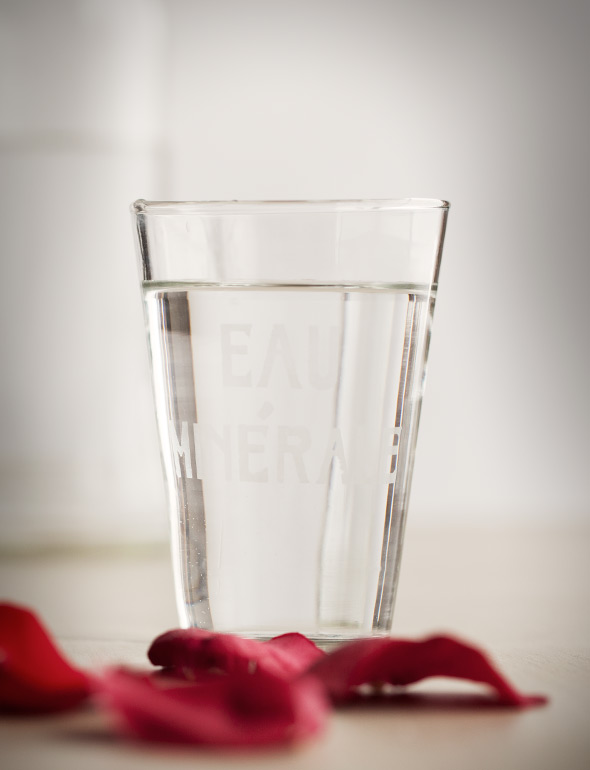Why water matters.
Studies say that drinking water does not help with weight-loss because it is not showing to burn calories. Well – They missed the point! It is the cause and effect of drinking water or on the other hand, being dehydrated, that we need to have a conversation about! Not the water itself. Studies tend to look at the food or substances in an isolated situation and that is not how we function as human beings. We are utterly integrated and rather complex; in a good way.
The first step in my online 9-step nourishment program is about rhythm and water. Two basic elements that help us come out of survival mode and therefore start us living towards getting healthier.
So just to clarify; you do not burn more calories from water, but you get a lot of other benefits.
- When you are hydrated your body’s metabolism works more optimally. When you are dehydrated you also feel more sluggish and tired, which is how we often end up snacking more and eating more sugary and fast foods. That affects your overall energy levels because of imbalanced sugar levels (energy) and the sudden drop that happens after processed sugar, which then begs for coffee and more sugar. Distraction, confusion and lack of motivation to follow.
- Being dehydrated also causes more aches and pains in your body, making it less motivating to move and exercise. It also makes it harder to perform better every day, because you are fighting against your own body rather than with it.
- And of course there is the case of toxins in your body that affect the metabolism as well. That causes irritability, overall health decline, and issues with weight. Drinking water helps rid your body of toxins so in a round about way; water does help with weight-loss, but more so because it helps your overall health! It helps you perform better everyday because you feel better.
- Drinking water helps you be more focused, have more energy, feel less irritable and more open minded. Studies where prisoners drank more water showed a decline in violence. That means a better work-day and better team-work. It means better productivity and better effectiveness.
WHY?
Because water is one of our 3 basic needs for survival and if you are dehydrated your body goes into survival mode, which in our modern world means stress. I know that running to a meeting and bringing your water seems like the extra thing to do, not to mention having to pee. But what if the small inconvenience would propel you into feeling fit for the “fight”? If you were a marathon runner, which essentially you are all day, would you expect to run the entire trip without water? I thought so…
To tap or not?
Now there is a bit more I want to add to the water conversation. Many say that tap water is better, some say that you have to go bottled. It is confusing indeed.
What I recommend is to consider these 3 questions for your tap water:
- Where does it originate (in NYC it is from upstate NY from example),
- What has been added to the water to treat it. Yes you might think your water is just as clean as the spring it came from but actually you can find chlorine, fluoride, and even arsenic added to your tap water. Where it originated from might be a spring in the Catskills, but in the process of getting to you…well…it is not just spring water anymore.
- What kind of pipes is in running through to get to you? That can add to what is in your water such as lead and rust from old pipes.
For bottled water consider this:
- Where it originate from is also a consideration here for two reasons. Sometimes it is tap water that is purified. Sometimes it is spring water. The purified water might be just fine, but the purification process could also take all the minerals out of the water and unless it is added back in you end up with “dead” water, which is also acidic water. Some companies add minerals back in to make the water more alkaline again.
- If it is spring water you might want to also note where it came from because of how far it travelled. From a perspective of eco-consciousness that is important, but from a health perspective it actually is too. It might have been exposed to heat, it might have been in the bottle for a long time… and that brings me to the next question.
- What kind of bottle is in it? If it is in a plastic bottle you might get exposed to toxins from the plastic. BPA for example, which is the plastic bottles, affects your hormones as well as other toxins that get absorbed in your tissue.
Alas…what is a human being to do to get enough water everyday? And you actually need quite a lot. The going rate for recommended intake for a normal “eater” is about 1/2 your body weight in ounce. That adds up to a couple of liters of water for a grown person. If you eat a lot of foods that are high in water content (like vegetables) you probably don’t need as much, but how you live your life also has to be added to the consideration. Exercise, caffein, and alcohol will have you needing more water.
So drink up and enjoy whatever fresh nice water you can get your lips on. Don’t fret it so much that drinking water becomes hard to do but when you can; practice aware and mindful choices. And drink more water – deliberately.


